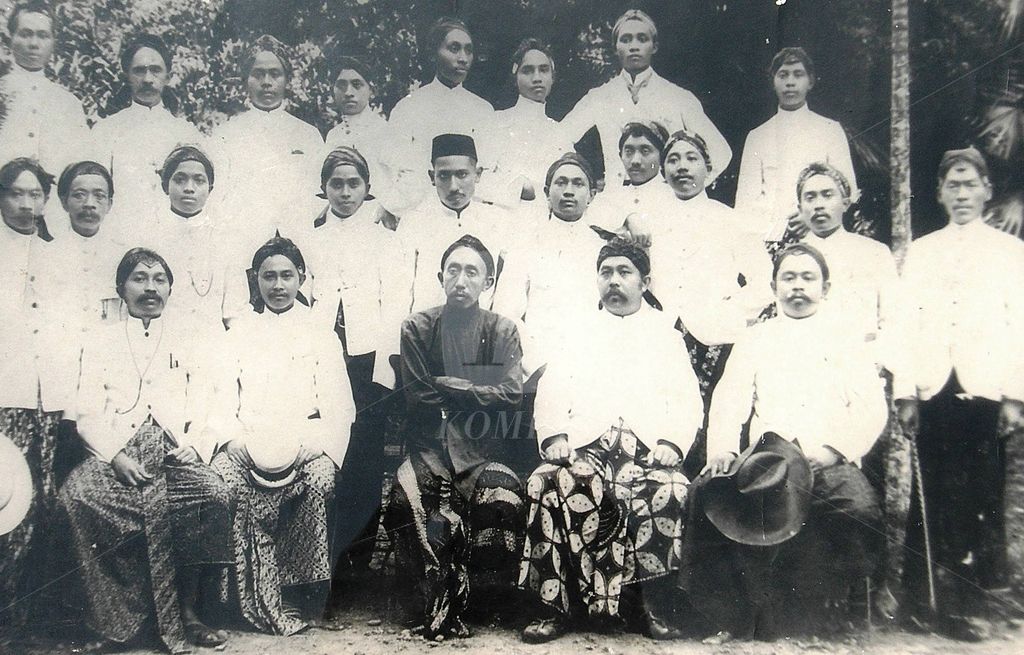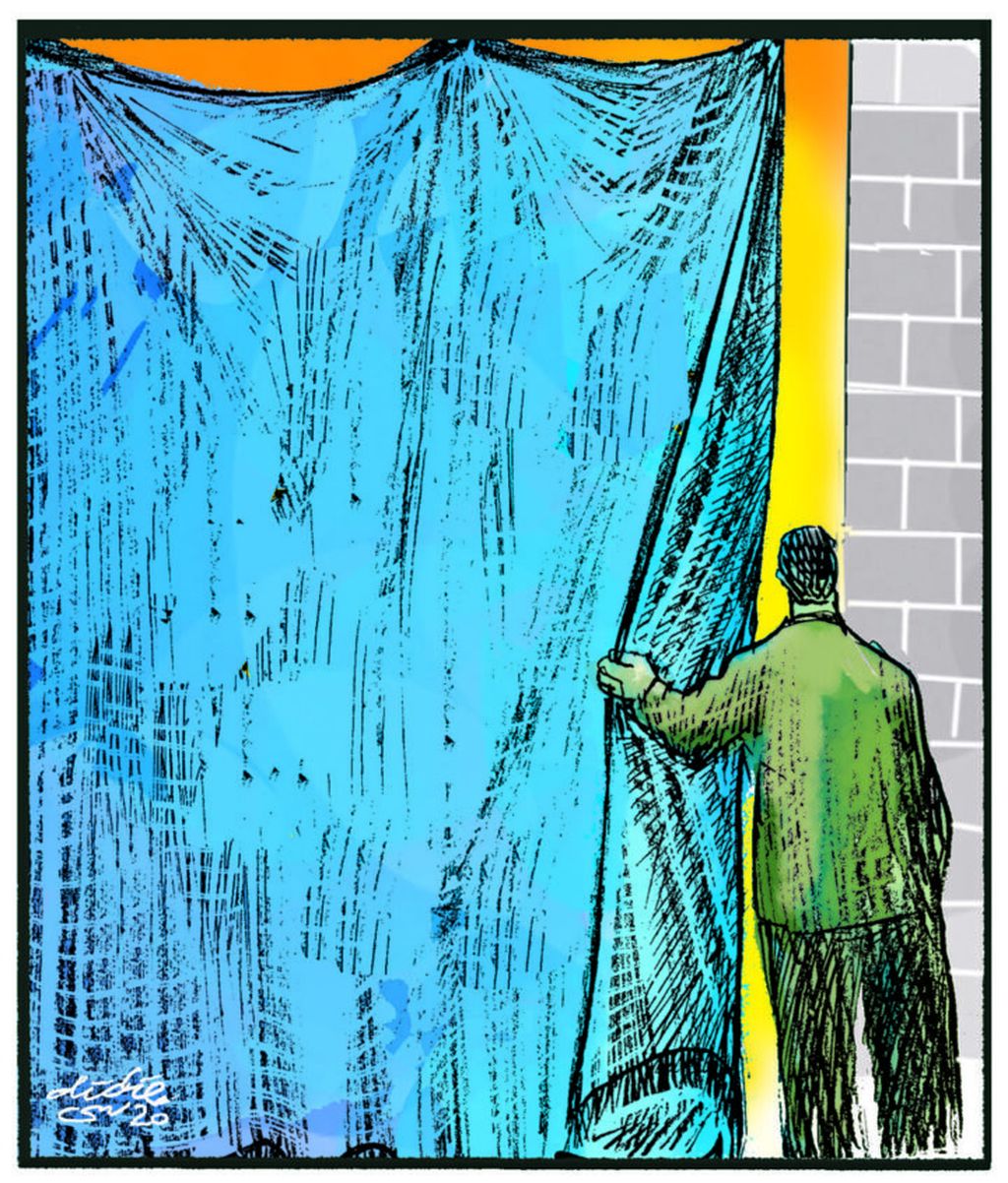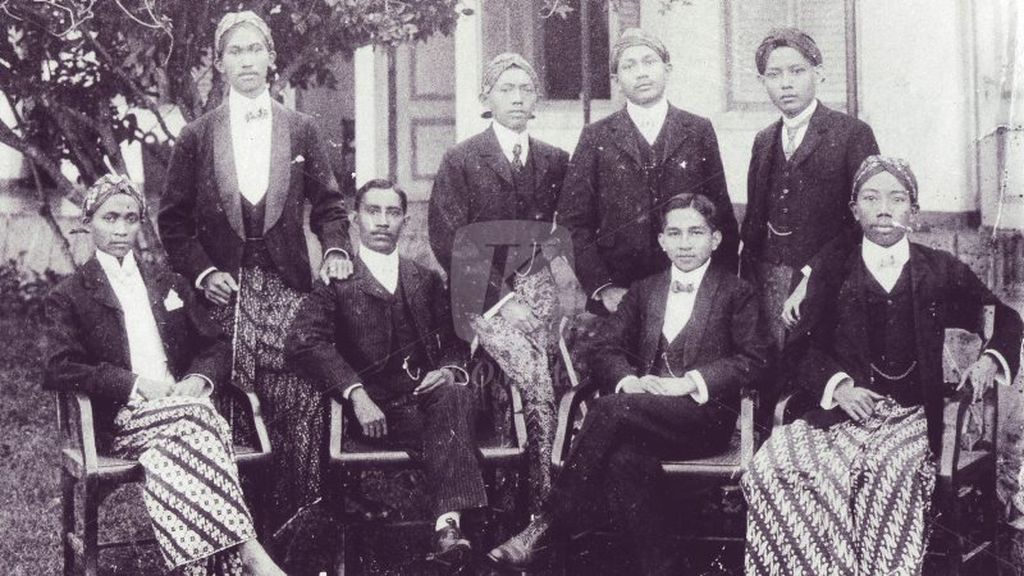Post-Coronavirus Awakening
Where did the national awakening effort have to start? From the spirit of the age who realized that a change of people would not occur until the people changed the mental realm that radiated the dawn of reasoning.

Group photo of the Old Group and the Young Group the Executive Board of the Boedi Oetomo Congress and Stovia Students, the founder of Boedi Oetomo.
Awakening often starts from crisis and adversity. The awakening of the Renaissance in Europe skyrocketed from the runway of the dark ages. Indonesia\'s national awakening in the early 20th century departed from the socioeconomic crisis as the impact of the liberal economic regime at the end of the 19th century.
A catastrophe is like a pregnant woman bearing a child of progress. The birth of Budi Utomo (BU), 20 May 1908, was determined as National Awakening Day by President Sukarno in 1948, in an effort to promote national unity, when a young republic that had to face Dutch aggression was actually beleaguered by political divisions. The reason for choosing BU was probably because it was a moderate modern movement organization, in an effort to transform itself into an unsustainable political party so that it did not become part of the parties involved in disputes during the revolution era.
Whatever the reason, the determination of BU as a sign of the awakening must be seen as pars pro toto; pointing to one thing to describe the overall emergence of various similar organizations that fought for progress in the early 20th century. Apart from that, the birth of BU and other organizations of that era did not move from a vacuum, but departed from the socio-economic crisis and on the path of movement that had been flattened by the pioneers.
According to the theory of social movements, the emergence of that movement went through a kind of life cycle, starting from the hatchery phase, formation and consolidation. Social movements rarely appear spontaneously; but require a long preparation period. No social movements emerge to find an available political opportunity, a context of social problems and also a context of communication, which opens opportunities for the articulation of problems and the dissemination of knowledge (Eyerman and Jamison, 1991).
Also read : Diverse, but One Purpose
As a social movement, the national awakening found its period of hatching since the end of the 19th century, as the political excess of the liberal regime\'s education. In an effort to expand the supporting bureaucracy to the plantation industry, the liberal regime needed teacher schools to prepare technical personnel. Therefore, the modern educational institutions that were first established were indigenous teacher training schools (kweekschool); beginning in Surakarta in 1851/1852, followed by several similar schools both inside and outside Java especially after 1870.
Until the end of the 19th century, the teacher\'s role in promoting the discourse of kemadjoean (progress) was very prominent, due at least to two reasons. The teaching profession up to that time gathered the largest portion of the best-educated native people, and as educators felt called to carry out a sacred mission to enlighten their fellow countrymen. Moreover, the teaching profession was less valued than administrative positions, so that it stimulated them to become articulators of the concept of kemadjoean in order to make it a new benchmark in determining social privileges.
Also read : National Awakening in the Era of Identity Politics and Social Media

The idea of kemadjoean and teacher criticism of the existing conditions was articulated through print media and the various associations they founded, such as Soeloeh Pengadjar (since 1887) and Taman
Pengadjar (since 1899), along with the most influential teacher association, the Mufakat Guru, with membership in a number of regencies in Java.
Almost at the same time, in the last years of the 19th century, a liberal economy being developed with the cruel exploitation of Indonesian workers experienced an acute crisis. The ongoing crisis in socio-economic life occurred due to economic stagnation, crop harvest failures, livestock diseases, hunger, and health vulnerability due to malnutrition and various disease outbreaks.
The various social catastrophes created a new climate of opinion and political atmosphere in the Netherlands. Parties tended to support state activities in matters of expansion and economic efficiency, including improving welfare in the colony. Through the 1901 General Election, the Christian Party emerged as the winner, making liberalism an obsolete creed, replaced by ethical politics.
Under the Ethical Politics, educatie (education), irrigatie (irrigation), and emigratie (transmigration) were priority welfare programs, with education seen as the most essential thing. In the eyes of the father of the ethical movement, Th Van Deventer, improving the welfare of indigenous people was difficult to achieve without the presence of indigenous personnel who were trained adequately to be able to carry out their duties. Through education, he dreamed of the rebirth of the Indies.
Under the ethical education regime in 1900-1902, the Javanese-Doctor school which was established in the end of the 19th century was converted into the School tot opleiding Van inlandsche artsen (STOVIA). The length of study was extended to six years of the core stages of teaching medicine (Geneeskundige), after following three years of preparation, which made it equivalent to the initial level of college. This placed STOVIA as the highest level of education available in the Indies at the beginning of the 20th century. It was a number of students from this school who continued the baton of independence from the teachers, by establishing Budi Utomo.
Also read : It’s Time to Deal with Challenges

Moh Saleh with Boedi Oetomo\'s comrades in the courtyard of the 1908 STOVIA Building. Sitting from the left, Goenawan Mangoenkoesoemo, Latoemeten, Moh Arsjad, and Prodjosoedirdjo Figures, Standing from the left, Moh Saleh, Soesilo, Soetomo and Goembrek.
The spirit of change
The awakening movement initiated by Sutomo and his friends did not come in a sudden, but was the result of a conscious effort to learn and struggle. Where did the national awakening effort have to start? From the spirit of the age (zeitgeist) who realized that a change of people would not occur until the people changed the mental realm that radiated the dawn of reasoning. That awareness was not only reflected from the birth of "Budi Utomo" (virtue of reasoning), but also contemporary organizations, such as Jamiat Khair (an association of benevolent seasoning), and also Tri Koro Dharmo (three noble goals: sacred, honored, devoted). In short, good nature is used as the main foundation of awakening and progress.
According to Ki Hadjar Dewantara, "honor" implies "thoughts, feelings, and will"; pekerti (conduct of life) means "power". Therefore, "good nature" is the same as "culture". Education of good nature seeks the union of thoughts, feelings, and human willpower that encourages the power of energy that can give birth to good, right and beautiful creation and actions.
Considering that Indonesian society is a religious society, the path to virtue can be pursued by strengthening the religious ethos (elan vital). Indeed, there are cultural factors that are influenced by religion that become obstacles to progress. However, some research also shows an important contribution of confidence factors to economic progress and democracy. In the framework of the awakening, the eruption of religious spirit that swells should not stop merely as an expression of formalism and street rage. Religious passion must touch a more substantive depth: questioning the ethical-spirituality basis of the nation\'s progress.
Also read : Black and White of the Coronavirus
Religion can play an important role in crisis recovery if religious issues do not stop with what we believe, but especially in what we do. For this reason, religion does not need to abandon its beliefs and rituals, but rather emphasizes the importance of a vision of spirituality and ethical commitment at the heart of society. The religious mode which stops as an outward worship of religious formalism, without the ability to explore the inner values of ethics-spirituality, is only surfing on the surface of the waves of danger.
Without diving in the depths of spiritual experience, diversity becomes barren, dry, and hard. Without contemplative power and the ability to reconcile with mystery and uncertainty, religious people can impose absolutism in response to fear of the complexity of world life, which creates inward destruction and outward threat. Crisis recovery loses its base of belief when religion which is supposed to help humans to nourish the sense of holiness, empathy, and care even reflects the feelings of despair and violence in the form of hostility and exclusion.
/https%3A%2F%2Fkompas.id%2Fwp-content%2Fuploads%2F2018%2F01%2Fkompas_tark_22844647_96_0.jpeg)
Ki Hadjar Dewantara statue in front of pendapa at Taman Siswa school complex, Jalan Taman Siswa, Yogyakarta, Monday (11/4/2016). The school was founded on July 3, 1922 at the residence of the deceased national education figure Ki Hadjar Dewantara and continues to play a role in educating the nation\'s next generation.
Progressive nationalism
The main agent in driving this honor awakening was the young people. BU\'s establishment was a brave attempt from the creative minority of its time to rise from backwardness and oppression by fighting for the movement of progress. The progress movement spearheaded by young people (aged 19-21 years) was carried out mainly through the cultivation of cultural capital (teaching, culture): seeking wider access to education for the indigenous, raising scholarships (studiefond), and cultural revitalization.
The nurturing of cultural capital was then strengthened by political capital by trying to give birth to new leadership. By launching criticism of the failure of the old leadership in protecting the interests of the people, BU initially tried to present a new leadership, by implementing modern management that relied on the superiority of the "mind" (meritocracy) rather than heredity. These BU pioneering steps, through their linkages with other revival movements, gave birth to a wave of national-scale change that paved the way for the awakening and independence of Indonesia.
By learning from history, we can reflect on the importance of cultural (mental-character) preconditions for national awakening. Nevertheless, the mentality style needed for today\'s national revival must naturally be adjusted to the challenges of contemporary nationalism. With the passing of colonialism, we must move from "negative" (defensive) nationalism to "positive" (progressive) nationalism. Experiences of oppression, discrimination, exploitation, and marginalization deserve to be regretted, deciphered and cremated. "But, human," said Isiah Berlin, "does not just live to combat evil. They live with positive goals, to bring goodness."
By learning from history, we can reflect on the importance of cultural (mental-character) preconditions for national awakening.
Every major leap in Indonesian politics is always captured by the past. Our habit of condemning the past by repeating it, not by surpassing it, makes Indonesian political behavior never go beyond its childish phase (regressive politics). To go beyond the past a more progressive conception of nationalism (patriotism) is needed. Nationalism does not only rely on what can be uprooted and resisted, but also on what can be built and developed. The historical project does not only maintain, but also improves the condition of the country.
We can learn from the experience of Germany and Japan. As the losing party in the war, there was a time when the pride of their "negative" (defensive) nationalism collapsed. After World War II, many Germans were not confident singing their national anthem. However, the two nations soon rose up, by inching from negative nationalism to progressive nationalism. The war energy was channeled into positive energy through the development of technology and civil industries, such as cars, machinery, electronic products, and medicines, which are very competitive in the international market.
Happiness, welfare, and progress are the most important products of progressive nationalism. In that context, the Covid-19 outbreak caused by a new type of coronavirus is a moment of the deciphering of our authenticity. A country with an abundance of medicinal materials is unable to meet drugs and health equipment for their citizens. Located in the tropics with an abundance of various foodstuffs it cannot produce food sovereignty. The vast ocean cannot meet the salt and protein. When cohesiveness is needed, the officials are even involved in fierce argumentation. Even worse, there are those who gain profits by manipulative ways from the disaster situation.
Cultural strategy
To be able to get expectations closer to reality, the accuracy of the cultural strategy that can build a proportional relationship between objectives and means, between aspirations and capabilities, is needed. In this connection, there needs to be the power of self-reflection, which can unite the mind and heart in the spirit. By integrating in spirit, we can get out of the dark alley to the path of light by taking a number of steps. We need joint recognition of crises in various fields. Without sincerity and agreement of a crisis, we cannot overcome the problem. Next, we must create a dividing fence, which nicely separates between the aspects that are already good and the side of problems that needs a solution.
/https%3A%2F%2Fkompas.id%2Fwp-content%2Fuploads%2F2019%2F10%2Ffeecee5f-1387-4ebb-b5e2-7ba9bc8b66d1_jpg.jpg)
Yudi Latif
We need to do self-appraisal honestly. Do not delude ourselves with image engineering that exaggerates small achievements. We can learn from the experience of our nation\'s own history in overcoming past crises and failures. We can also learn from other countries\' models in overcoming problems, to be adapted to the specific context of our country. Do not forget, a crisis situation also requires the strengthening of national identity by revitalizing commitments to the shared core values (Diamond, 2019). Finally, we must stop simply lamenting darkness. The darkness cannot be removed by darkness; darkness can only be removed by light. Millions of fireflies that simultaneously ignite the light of the mind will emit waves of enlightenment, as a guide for the nation towards awakening.
Yudi Latif, Member of the Indonesian Academy of Sciences.